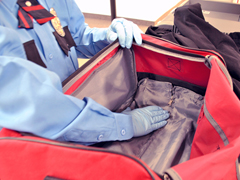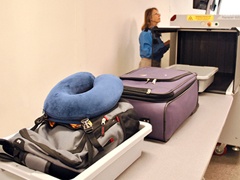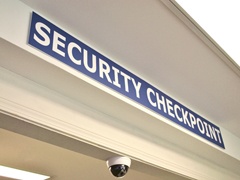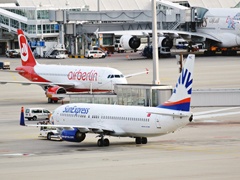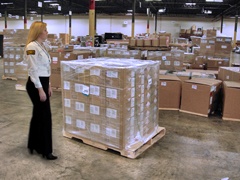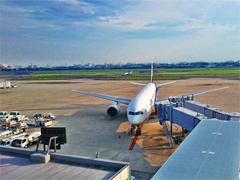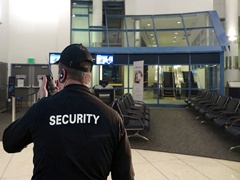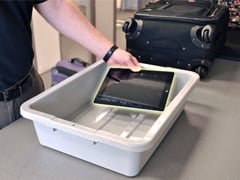Vicki Tran
Vicki Tran is Marketing Coordinator at Safe Passage International. She implements various marketing campaigns and writes content for the blog and website. Vicki loves volunteering her time to local organizations and is a huge fan of baseball. Go Giants!
Read some of her blog posts below:
Concealment is the act of hiding or preventing something from being known. It happens more often than we’d like, ranging from minor infractions to major threats to our security. The unknown variable of who may or may not try to sneak items passed the checkpoint constantly requires security personnel to be on guard.
Fortunately, personnel are trained to detect anomalies and pick up on various concealment methods used by these offenders. Let’s discuss concealment and some creative tactics observed in the industry that all checkpoint staff should be aware of.
Read More
Topics:
Aviation Security,
General Security,
Cargo Security,
Ports & Borders,
Critical Infrastructure,
Transportation
The abundance and variety of items passing through a security checkpoint is overwhelming. Yet X-ray screeners are under immense pressure to examine all goods with speed and accuracy. This can be a difficult task considering throughput could be any combination of items imaginable.
In order for X-ray screeners to be successful on the job, they must constantly be exposed to different items under X-ray. Continuous practice is absolutely necessary to introduce new material to build upon a screener’s mental image library and keep the mind sharp.
Read More
Topics:
Security Training,
Training & Development
Air cargo has always been a target for those wanting to cause harm to the transport industry. One of the ways they’ve done that is by concealing explosive devices into air freight on both cargo and passenger aircraft. Unfortunately, successful attempts have led to catastrophic consequences including severe damage to airline assets, disruption of the industry, and loss of life.
That’s why air cargo screening remains an imperative step in maintaining security. Without it, the industry would be incredibly vulnerable to explosive threats. Proper diligence must be exercised to protect the air cargo industry, the people working in it, and those utilizing its services.
Read More
Topics:
Aviation Security,
Cargo Security,
Security Threats,
Transportation
Mailroom screening is an important part of keeping your critical infrastructure facility secure. As an essential part of the community, you cannot afford to have any disruptions to your day to day operations.
Whether you are a bank, correctional facility, school, or courthouse, your mailroom is responsible for processing incoming and outgoing mail. Ensuring operations around this are kept safe is imperative. With a proactive approach, you’ll be prepared to protect your facility, staff, and assets in case of an attack.
Read More
Topics:
General Security,
Critical Infrastructure,
Security Threats,
Current Events
Today’s passenger and cabin baggage screening process is functional and airports manage to get by, but it is not sustainable in the long run given the industry’s predicted growth. The current screening model is inefficient and comes at the cost of many within the industry including airlines and passengers. For the past few years, several airports have shifted their attention to Smart Security solutions to handle the screening of passengers and their belongings.
Smart Security is a joint initiative of the International Air Transport Association (IATA) and Airports Council International (ACI). Its goal is to streamline the passenger journey from curb to airside. The idea of Smart Security has been around for a few years now and the industry is just now able to implement these ideas into practical solutions without sacrificing safety and security.
Read More
Topics:
Aviation Security,
Trends,
Critical Infrastructure,
Transportation
Security threats to the aviation industry are a serious matter. There will always be people who wish to do harm to the industry, the professionals working in it, and the civilians utilizing its services every day. This constant pressure from outside forces means the industry can never rest when it comes to security. In fact, it must be proactive to stay ahead of the dangers threatening aviation.
Aviation security threats targeting commercial aviation and air cargo are incessant. From minor to extremely serious, the range of threats and attempted attacks vary on a day to day basis. We’ve comprised a comprehensive list of threats with the most impact on aviation. Let’s take a closer look at these aviation threats.
Read More
A new year means another year of security training. The thought of recurrent training usually re-enters the minds of training managers and administrators at this time of year. Sometimes seen as an overwhelming process, the anticipation of rolling out another year of security training to personnel can be stressful.
It’s not always easy to coordinate but if you know the basics and have the right tools, it can be much easier than anticipated. And when the time comes, you’ll be able to handle a compliance audit like a pro. First, let’s get down to discussing the basics of recurrent security training.
Read More
Topics:
Audit Preparation & Compliance,
Security Training,
Aviation Security,
Training & Development,
Cargo Security
Governments are the last line of defense when it comes to shaping policy concerning aviation security. Since there is no overarching global regulator to oversee all governments in every country, the handling of aviation security policy ultimately comes down to individual governments themselves.
As a result, the aviation industry faces challenges related to individual governments and how critical aviation security issues are handled by each. Industry desperately needs governments to overcome these obstacles in order to have a more secure and effective aviation market. Let’s discuss some governmental challenges in the aviation sector.
Read More
Topics:
Aviation Security,
Cargo Security,
Transportation
What does it mean to have strong aviation security culture? A strong aviation security culture is one in which security is a top priority for all staff. It means that security can never rest at the back of our minds; it must constantly be at the forefront. It also means that security cannot be an afterthought; it must be approached with a proactive mindset.
If we lose sight of the importance of aviation security for a moment, we risk becoming vulnerable to the imminent dangers that constantly pressure our industry. Security is everybody’s business. So, what can you do to build a strong aviation security culture within your company?
Read More
Topics:
Security Training,
Aviation Security,
Training & Development,
Cargo Security
As specific airports facing the large PEDs ban implement stricter security controls, governments have been lifting restrictions on a case by case basis. The personal electronic device (PED) ban prohibits passengers from carrying large electronics such as tablets, eReaders, and laptops aboard certain aircrafts flying direct from one airport to another.
The main concern centers on select airports with insufficient security measures in place to prevent a new type of threat from entering secure areas. Threat PEDs cleverly use everyday consumer electronics to conceal improvised explosive devices (IEDs). The resulting product is items such as laptop bombs. Airports worldwide must reevaluate current security controls and if necessary, implement additional measures to effectively intercept threat PEDs at the checkpoint.
Read More
Topics:
Security Training,
Aviation Security,
Security Threats,
Current Events


